Dewan Cement Limited (PSX: DCL) has flipped the switch on a 6-megawatt (MW) rooftop solar array at its Dhabeji, Karachi works, instantly supplying more than half of the plant’s electricity demand with photons rather than furnace oil or grid power. The project, disclosed to the Pakistan Stock Exchange earlier this week, sits astride the cement maker’s captive power station and feeds straight into the plant’s internal network.
The installation positions DCL among a small but fast-growing cohort of Pakistani manufacturers turning to on-site photovoltaics to blunt fuel-price volatility, tame emissions and improve energy security. Within the past quarter alone, flat-steel producer International Steels Limited has energised a 6.4 MW system at its Port Qasim mill, while textile and food-processing players are lining up for similar solutions. Industrial demand is emerging as the single most dynamic segment of Pakistan’s nascent solar market, outpacing residential net-metering in both absolute megawatts and year-on-year growth.
Utility-scale renewables have struggled to clear policy hurdles, but behind-the-fence solar is booming. Developers cite simple economics: levelised costs for an industrial rooftop array now sit well below Rs 12 per kWh – less than half the current off-peak industrial tariff – while installation timelines rarely exceed nine months. And unlike diesel back-up, photovoltaic generation comes with neither import bills nor exposure to the rupee’s chronic slide. The Ministry of Energy’s draft Solar 2030 Roadmap foresees 9 GW of merchant and captive PV by the decade’s end, with Karachi’s export-oriented corridor accounting for a third of that capacity. The content in this publication is expensive to produce. But unlike other journalistic outfits, business publications have to cover the very organizations that directly give them advertisements. Hence, this large source of revenue, which is the lifeblood of other media houses, is severely compromised on account of Profit’s no-compromise policy when it comes to our reporting. No wonder, Profit has lost multiple ad deals, worth tens of millions of rupees, due to stories that held big businesses to account. Hence, for our work to continue unfettered, it must be supported by discerning readers who know the value of quality business journalism, not just for the economy but for the society as a whole.To read the full article, subscribe and support independent business journalism in Pakistan









